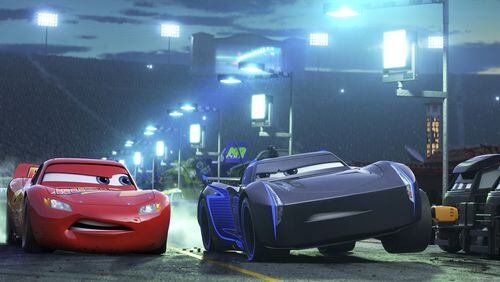The wheel on that screen keeps on turning, as a third installment of the “Cars” franchise rolls into theaters, in an obvious attempt to churn out more grist for the merchandising mill. It’s ironic then, that one of the plot points in the film involves the distasteful option that Lightning McQueen might have to sell out, slapping his number and likeness on everything from mud flaps to detergent. It’s part of the “brand,” his new sponsor purrs, and we’re to understand that this is bad; it takes away from McQueen’s individuality and personal freedom. And yet, what is a “Cars” sequel if not a brand extension? It certainly isn’t quite a movie.
Directed by Brian Fee, it’s merely a sketch of a movie, a series of familiar tropes and characters known from the prior two “Cars” films.
Legendary racer Lightning McQueen (Owen Wilson) is a washed-up old race car, made obsolete by the tricked-out new rides that hit the speedway, equipped with new technology, new training and the willingness to talk smack. His nemesis is rookie Jackson Storm (Armie Hammer), and though Lightning should really hang up his tires, he insists that he’ll decide when he’s done.
After a nasty crash, he snaps up a new sponsor, Sterling (Nathan Fillion), and starts trying to beat the young guns at their own game, with his own state-of-the-art training facility and trainer, Cruz (Cristela Alonzo). She’s the vehicular version of a SoulCycle instructor, urging her charges to push harder, while thinking of fluffy clouds. But Lightning is old school, and wants to get his wheels dirty, so the duo set off for some unconventional outdoor training.
Within this surreal world of talking cars, on top of the sports movie cliches and the training montages there has been laid a hollow storyline about female empowerment. Cruz, you see, never dreamed of being a trainer, but a racer, as she eventually reveals to Lightning. Her subsequent fight to achieve this dream, and ultimate success, feels hollow because the male cars spend more time berating her than empowering or uplifting her, and her success is only granted through their channels of power. The subplot feels hollow because, again, it’s clearly just more brand extension — little girls can be consumers of toy cars too! — than any sort of story development with heartfelt meaning.
The one thing the writers nail, however, is the sense of impostor syndrome that Cruz feels in this masculine world — because the male cars literally tell her she’s an impostor. The way that Lightning and Jackson speak to her, the way they manipulate her when they are feeling threatened, and her bursts of anger are all too real, perhaps even a little too real for a lighthearted, supposedly inclusive kids’ movie. Cruz’s ultimate redemption is far too little too late in a movie that’s too thin to sustain any sort of real earned emotion.
MOVIE REVIEW
“Cars 3”
Grade: D+
Starring voices of Owen Wilson, Chris Cooper and Larry the Cable Guy. Directed by Brian Fee.
Rated G. Check listings for theaters. 1 hour, 49 minutes.
Bottom line: Moral of story feels hollow and too little too late
About the Author



/cloudfront-us-east-1.images.arcpublishing.com/ajc/P7DYBH6TO7FEKG4SUXQQKADRXE.jpg)


